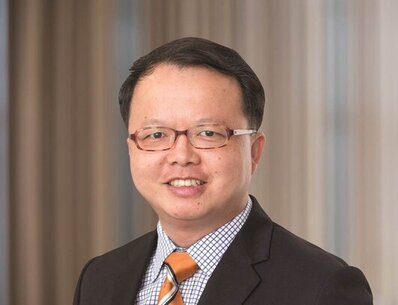Mapletree Investments makes a financial gift to advance NUS researchers’ efforts that produced the world’s first rubber aerogels

Mr Wan Kwong Weng, Group Chief Corporate Officer of Mapletree
In a chance encounter 10 years ago, a janitorial colleague challenged NUS Associate Professor Duong Hai-Minh to find new uses for the waste paper that he had to throw away every day.
That conversation inspired the direction of Prof Duong’s research to mitigate the problem of wastage in modern society. Starting with used paper, he converted many waste materials into aerogels with a wide variety of uses. Cotton, soy bean pulp, even pineapple were used in his experiments!
In 2019, Prof Duong and his team successfully created the world’s first aerogels made from scrap rubber tyres. These rubber aerogels are extremely light and porous, with excellent sound absorption and heat insulation properties. Highly durable, they have an amazingly wide range of applications.
Beyond the commercial benefit of converting scrap into a high-value product, the novel technology represents a big step forward in the growing demand for sustainable solutions.
In the case of used rubber tyres, these have been notoriously difficult and expensive to recycle. As such, a considerable amount ends up in landfills that are fast running out of space. Tyres also contain synthetic rubber, a plastic polymer, which contributes to the world’s plastic pollution.
“This breakthrough could be the solution to the world’s plastic waste problem. One of the least recyclable wastes that usually ends up polluting oceans and clogging up landfills could potentially be turned into a life-saving material for fire insulation and cleaning up of oil spills,” remarked Prof Duong.
Recognising the huge potential of the project by Prof Duong and his team from the Department of Mechanical Engineering, Mapletree Investments has made a financial gift towards amplifying the research efforts and raising public awareness of recycling.
“Aligned to Mapletree’s corporate social responsibility which aims to support initiatives on the environment and on education, Professor Duong’s breakthrough in material recycling would help raise awareness of green technology and its positive impact on the wider community,” said Mr Wan Kwong Weng, Group Chief Corporate Officer of Mapletree.
The research also resonates with Mapletree’s commitment to reduce negative environmental impact.
“Mapletree has been adopting sustainable designs and the usage of environmentally friendly products in its real estate development projects. The team’s research presents a novel environmental solution with the development of an aerogel that could potentially be superior in heat and sound insulation, competitive price point and offers better durability than currently used conventional building insulation material,” Mr Wan elaborated.
Reacting to the generous gift from Mapletree, Prof Duong remarked, “This has been received with pride and humbleness – pride because of the recognition from a major Singaporean industry, and humbleness because we will be able to accomplish so much with it. We are simply at the tip of an iceberg!”
Upcoming plans from the NUS and Mapletree collaboration include building a lab facility where the technology can be scaled up to produce industry-standard samples and other types of waste materials can be explored for their upcycling potential.
Outreach programmes will also be developed to educate the public about the revolutionary environmental solution, while a platform for students will be established to facilitate learning about green aerogel technology.
Looking forward to the advancement of this research project, Mr Wan commented, “It is our hope that this grant will lead the NUS team to greater heights in this field of recycling technology and commercial adoption of its outcomes.”
Beyond the accolades and commercial success, Prof Duong and his team hope to make a social impact on the global drive towards a sustainable future.
“By providing a solution to turn trash into treasure, we can inspire people to appreciate the value of waste materials and dispose of them in an environmentally responsible manner.”






